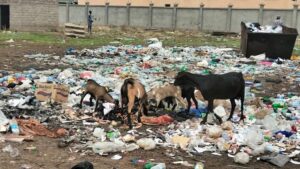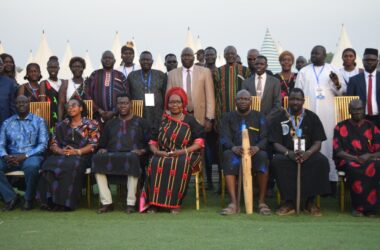
Stray animals feeding on poorly disposed waste along a street in Juba City. Photo: Courtesy
By Kei Emmanuel Duku
A leading environmentalist and member of the East Africa Climate Legislative Assembly (EALA), Longokwo Louis Lojore, have raised concerns that the rapid growth of urban centers in South Sudan is posing a significant threat to biodiversity. This threat, she says, is primarily driven by poor plastic and solid waste management.
Lojore, said a 2024 survey by Blue Community Net, revealed that staggering 40% of plastic bags are never properly disposed of. As a result, they end up polluting rivers, soil, and public areas.
She added that an influx of discarded bottles, sachets, and packaging is further worsening the crisis adding that the consequences are already visible, with plastic waste clogging Juba’s drainage channels and exacerbating urban flooding during the rainy season.
She added that the problem extends beyond urban areas. In states like Bor and Bentiu, livestock are ingesting the waste, which leads to fatal digestive issues and threatens food security.
Another survey highlighted a grim reality where the River Nile and local dams are suffocating under a tide of plastic, endangering aquatic life and the livelihoods that depend on them.
The activist explained that the country’s lack of a centralized waste management system is at the heart of the issue. She noted that approximately 70% of disposal sites are located near water bodies, increasing the risk of contamination. “Open dumping is particularly prevalent in informal settlements, leading to serious health risks for residents from air and water pollution,” Lojore stated.
Amid these severe challenges, Lojore sees a wave of innovative, community-driven solutions emerging. In Juba, the “EcoBuild South Sudan” initiative is turning discarded plastic bottles into low-cost building bricks for classrooms, transforming waste into a valuable resource. In Yei River County, another group is using mobile carts to buy used plastic bottles from residents, creating a new source of income from what was once considered garbage.
Additionally, youth-led campaigns in Wau are leveraging local theatre and radio to educate communities on proper waste disposal, fostering a culture of environmental responsibility.
The environmentalist underscored that these grassroots efforts highlight the critical need for a multi-pronged approach to tackle the crisis. She called on experts and government partners to enact new national legislation to phase out single-use plastics, establish dedicated collection points with incentives for waste sorting, and support green enterprises like the national Ministry of Environment and Forestry’s PLASCOM initiative.
“South Sudan’s plastic pollution is a call to action,” Lojore added. “These innovations demonstrate that with local leadership and strong policy, the country can not only restore its natural beauty but also build a more resilient and cleaner future for generations to come.
Since the country gained independence in 2011, Juba City has been grappling with a severe waste management crisis driven by rapid urbanization and a lack of proper infrastructure. The city’s population growth has outpaced its capacity to handle waste, leading to widespread open dumping and burning. Plastic waste, in particular, is a major contributor to this problem, as it is non-biodegradable and accumulates in large quantities.
A significant portion of this plastic ends up in drainage systems, causing blockages that lead to urban flooding during heavy rains. Waste is also routinely dumped near the River Nile, threatening the city’s main water source and contributing to pollution downstream.
The situation has been made worse by the absence of a formal recycling system means, that valuable materials are lost, and the health of residents is jeopardized by exposure to toxins from burning plastics and polluted water.
While the government has launched some initiatives, the activist said community-led projects have become essential to fill the gaps in the city’s waste management efforts.



